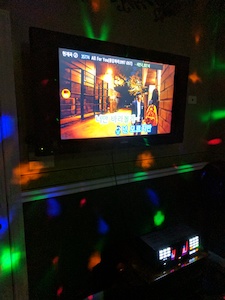Beyond Soju: the World of Korean Alcohol
Korean culture has swept the globe – K-Pop, K-Dramas, K-Beauty, and undeniably, K-Food. And what pairs better with delicious Korean cuisine than its unique and varied alcoholic beverages? While the small green bottle of Soju (소주) might be the most internationally recognized face of Korean alcohol, it’s merely the tip of the iceberg. The world of sul (술), the Korean term for alcohol, is incredibly rich, steeped in history, and offers a flavour profile for every palate.
The global interest in Korean culture continues to boom, making it the perfect time to explore beyond the familiar and discover both the celebrated staples and the hidden gems of Korean brewing and distilling traditions. Get ready to pour yourself a glass (or a traditional bowl!) and explore!
Review of restaurant “Doryang” in Seochon (Culinary Class Wars chef)

Doryang is a Chinese restaurant headed by one of the contestants of Culinary Class War on Netflix. I had been looking forward to trying this restaurant after passing in front of it multiple times when visiting Seochon, but I had never been able to secure a reservation slot. However, everything changed on March 25th when new reservation slots were added!
Dasan Station – Honest Review of Mom’s Touch Pizza & Chicken
Location: Mom’s Touch Pizza & Chicken, Namyangju Dasan Station Branch
I visited this location for the first time, and I was really impressed. The place was spotless, and everyone—from the owner to the part-timers—was super friendly. I’d only ever ordered delivery before, but dining in made a huge difference: the food was warm and definitely tasted better.

My husband had been craving about Mom’s Touch burgers since early morning, so we promptly put our diet plans on hold and headed over for a bite.
Checking Out Mankyeongsanghoe Near Konkuk University - My Honest Thoughts
(Location: Mankyeongsanghoe Konkuk Univ. Main Branch)
So, we braved the rain for a night out near Konkuk University! We had a bunch of dinner ideas, but everyone wanted something different. One friend was craving sashimi, another wanted something soupy, and someone else didn’t want sashimi to be the main event. Mankyeongsanghoe ended up being the pick because, hey, it looked like they had something for everyone!

Popular South Korean Drinking Games
One aspect of South Korean culture becomes very apparent after a few days in the country: the drinking culture is pretty developed. Alcohol made in South Korea is cheaply available in most convenient stores, and drinking establishments are open late at night/until early morning. South Koreans use alcohol to socialize and have developed many drinking games to do so. These games are especially popular among college students and in the army.
All the South Korean drinking games in this article play clockwise or counter-clockwise; just agree with other players before starting.
안녕클레오파트라 – Annyeong Cleopatra (Hello Cleopatra)
This simpler game consists of taking turns repeating the same song with a higher pitch than the previous player.
KPOP group Wanna One demonstrate the game 안녕클레오파트라 (Hello Cleopatra) in the video below.
노래방 - Korean Norebang (Karaoke) (and their complicated remote)

Some of the etiquette rules governing 노래방:
- Do not queue several songs at once, but let other people queue their own songs.
- Avoid looking at your phone frequently, as it is considered rude.
- If you see that you do not know a song as much as you thought, skip it (press 취소 followed by 시작 on the remote)
One of the barriers of entry to 노래방 for foreigners is probably the seemingly overly complicated remote. Learn the various features of the remote prior to going to 노래방 so that you can make the most of your time there! Check the picture (divided by zone) and the corresponding vocabulary below. You can also download this information and print it to take it with you to your next 노래방 session! If you live too far from a karaoke place, you can also buy a Korean karaoke machine for home use.
Washer & Dryer
Doing the laundry in Korea can be a daunting task, especially if not too familiar with its related words (drying, pre-wash, etc.) Similar to the 노래방 remote post, here is a breakdown of the common words written on washers and dryers (usually the same unit in Korea), and a photo example of how it looks like on a commercial machine.
South Korean LGBT Films: A Comprehensive List
Korean cinema has seen a rapid rise in LGBT-centered movies and short films in the last decade, but information in English about them is scant as best. The lists below attempt to fill this gap by classifying LGBT Korean movies produced over the year. These lists exclude dramas and movies that do not have main LGBT protagonists.
If a movie is missing from the list, please leave a comment here or on Facebook so that KoniKorean can add it to the list.
Coronavirus Korean Vocabulary and Resources
As the Coronavirus progresses in South Korea, this article lists vocabulary and resources in English and Korean to stay on top of the infection if you are currently in South Korea. This page will get updated as more information is available.
What to do. According to the CDC of Korea, for the general population (translated by KoniKorean):
- Wash your hands meticulously with soap under running water.
- When coughing or sneezing, cover your mouth and nose with your sleeve.
- Do not touch your eyes, mouth, and nose with unwashed hands.
- Wear a mask when visiting a medical institution
- Refrain from visiting places with many people
Most Popular Korean Movies in 2019
Wondering what the most popular Korean movies were in 2019? This article lists the most popular Korean movies in 2019 with links to popular streaming platforms. Leave a comment if you like any of the listed movies or disagree with the box office!
1. 극한직업 – Extreme Job
Genre: Comedy
Director: 이병헌 (Lee Byeong-heon)
Total Korean audience: 16.27M
Narcotics detectives go undercover and start a chicken restaurant to take down a gang. To the surprise of the detectives, the restaurant becomes widely popular, complicating their mission.